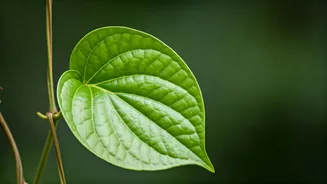Betel Leaves' Essence
Betel leaves, scientifically known as Piper betle, are a common element in various Indian cultural traditions. The leaves are used frequently for chewing
and are often offered as a welcoming gesture. The nutritional composition of betel leaves includes a variety of bioactive compounds. These compounds contribute to their diverse health benefits. The leaves are rich in vitamins, minerals, and antioxidants, each playing a role in the body's optimal function. These nutrients help with various functions, right from maintaining oral health to aiding digestion. It's a journey into understanding why betel leaves are not merely a cultural tradition but also a valuable component of a healthy lifestyle. This section illuminates the essence of betel leaves, their cultural importance, and their nutritional makeup, which helps provide a foundation for understanding their many health benefits.
Blood Sugar Support
One of the important benefits of betel leaves is their ability to help maintain healthy blood sugar levels. Betel leaves contain components that can improve insulin sensitivity and glucose metabolism. Several studies suggest that regular consumption of betel leaves helps regulate blood sugar. This is particularly beneficial for those at risk of or with type 2 diabetes. The leaves contain unique compounds that help in the efficient processing of sugars. This is done by aiding the body's natural mechanisms. Adding betel leaves to your diet might be a good idea for managing blood sugar levels, helping to reduce the risk of diabetes-related problems and promoting overall health. The specific mechanisms through which betel leaves influence blood sugar metabolism, providing a complete insight into this crucial benefit, are also examined.
Oral Health Champion
Betel leaves have been used for generations to promote oral health. They have strong antibacterial and antifungal qualities. This can help combat the bacteria that cause gum disease, bad breath, and other dental issues. By chewing betel leaves, it stimulates saliva production, which naturally cleanses the mouth. Saliva helps remove food particles and neutralizes acids that can erode tooth enamel. Traditional practices involve using betel leaves to freshen breath and maintain the cleanliness of the mouth. The active compounds in betel leaves fight infections and promote a healthy oral environment. Regular use can prevent common oral problems, which makes betel leaves a traditional yet effective oral health remedy.
Liver Protection Power
The liver is a vital organ that plays a crucial role in detoxification and metabolism. Betel leaves provide protection to the liver due to their antioxidant properties. They help in removing harmful free radicals, which can cause liver damage. The consumption of betel leaves can help shield the liver from the damaging effects of toxins. This promotes liver health. Betel leaves' protective action has been associated with a decrease in the risk of liver diseases. The regular intake of betel leaves will improve the overall health of the liver. The section investigates the ways in which betel leaves support the liver's ability to cleanse the body. It discusses the critical impact of these leaves on maintaining liver health and preventing diseases.
Digestive Relief Offered
Betel leaves have traditionally been used to aid in digestion and alleviate gastrointestinal issues. They have carminative properties that help in reducing gas and bloating, which makes digestion more comfortable. Chewing betel leaves stimulates the production of digestive enzymes, which enhances the breakdown of food. The presence of these enzymes helps the digestive system to be more effective and efficient. This can alleviate discomfort and improve nutrient absorption. Betel leaves have also been suggested to have anti-inflammatory effects that can soothe the digestive tract. This may help in easing the symptoms of conditions such as gastritis. Regular consumption of betel leaves after meals is a common practice to support digestion and promote overall gut health.
Wound Healing Properties
Betel leaves' remarkable healing abilities are due to their anti-inflammatory and antiseptic characteristics. When applied to wounds, betel leaves can help accelerate the healing process by reducing inflammation and preventing infection. They can be used topically on minor cuts, burns, and skin irritations. The bioactive components in betel leaves promote the generation of new tissues. The use of betel leaves is common in traditional medicine, owing to their ability to provide pain relief and aid in faster healing. The compounds found in betel leaves encourage quick wound closure and prevent infection, ensuring a smooth recovery. Their capacity to promote tissue regeneration makes them a valuable remedy for skin injuries.
Respiratory Comfort Aid
Betel leaves can also provide relief from respiratory ailments. They have expectorant and anti-inflammatory properties, which can help in clearing congestion and easing breathing difficulties. In traditional remedies, betel leaves are often used to address coughs, colds, and bronchitis. Betel leaf extracts have been shown to have antimicrobial effects against respiratory pathogens. This can contribute to better respiratory health. Inhaling the vapor of betel leaves, or consuming them, can help soothe the respiratory tract and alleviate symptoms of respiratory ailments. They can help in loosening mucus and easing coughs. The use of betel leaves is very beneficial in improving breathing and lessening respiratory discomfort, providing relief from a variety of respiratory problems. They have a soothing effect on irritated respiratory pathways.





















